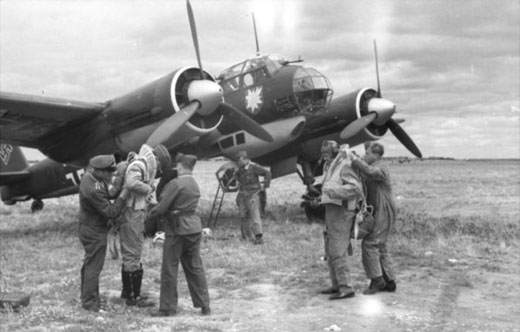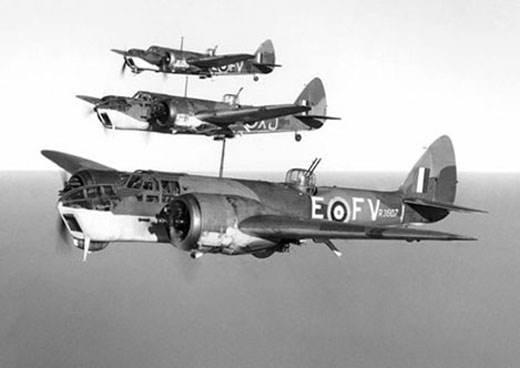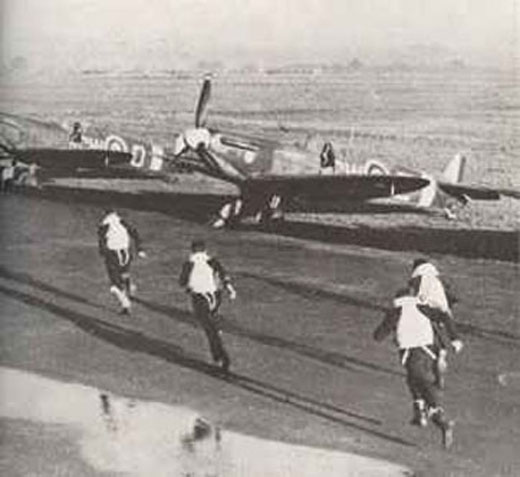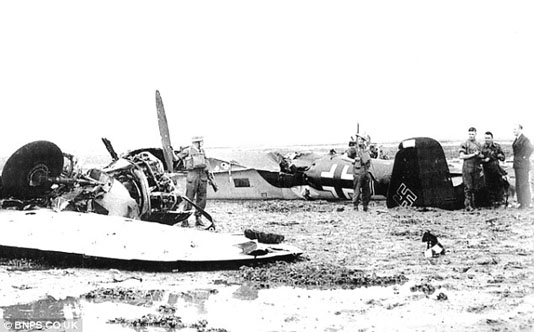Australia, Home Front
Two Cabinet Ministers, G. A. Street and J. V. Fairbairn, and the COGS, Gen Sir Brudenell White, are killed in an air crash near Canberra.
[Battle of the Atlantic
- U-60 sinks the Swedish steamer Nils Gorthon (1787t) 25 miles north northeast of Malin Head with the loss of 4 crewmen.
- The Swedish steamer Mongolia (2124t) sinks on a mine about 15 miles outside Kiel Bay.
Italy, Planning
The Italian Foreign Minister, Galeazzo Ciano, instigates a press campaign for an attack on Greece, and calls Gen Sebastiano Visconti Prasca, commander of the Italian troops in Albania, to Rome.
[Secret War
German aircraft drop parachutes over southern England which carry bogus operations orders, intended to create the impression that the invasion has begun.
[Battle of Britain
Day 35
Weather - Early morning mist with scattered drizzle in places and cloudy in the Channel. Mainly fair for rest of day.
Combat - The day known as Adler Tag (start of German High Command offensive to control the skies in prelude to invasion) starts early, at 0530hrs, with a large raid on the Isle of Sheppey and the airfield at Eastchurch by Do-17's and Me-110's. Spitfires of No: 74 Squadron intercepts the raid and are joined by Hurricanes of No: 111 and 151 Squadrons. At the same time Hurricanes of No: 43 Squadron attack a raid of Me-109's near Shoreham.
Over the next few hours' small raids of Ju-88's and Me-109's approach the coasts at Beachy Head, Isle of Wight, Portsmouth and Selsey Bill with interceptions made by Hurricanes of No: 152, 238, 257 Squadrons.
|
|
|
|
Me-109 Shot Down near Shoreham Airport |
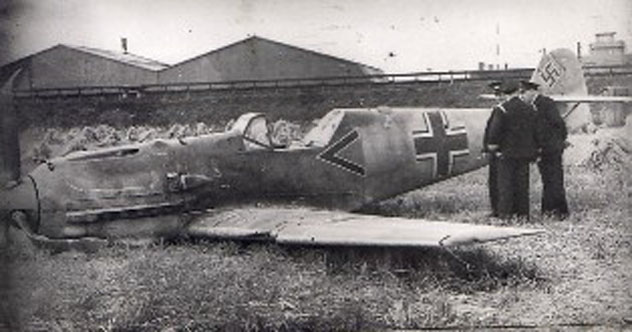 |
Early afternoon and a raid by Me-110's approaches Portland, which is intercepted by Hurricanes of No: 238 Squadron scrambled from Middle Wallop. Later, at about 1600hrs, large raids are plotted approaching the South of England along a wide front consisting of 120 Ju-88's, 80 Ju-87's, 30 Me-110's and around 70 Me-109's attack the Dorset and Hampshire coasts. Over Southampton Hurricanes of No: 43 and 257 Squadrons try to prevent the Ju-88's reaching their targets. At Portland Ju-88's and Me-110's are intercepted by Spitfires of No: 152 Squadron and Hurricanes of No: 213 and 601 Squadrons. Over Lyme Regis, Spitfires of No: 152 Squadron engage Me-109's whilst Spitfires of No: 609 Squadron attack the Ju-87's.
A raid at 1630hrs, of Ju-87's and Me-109's, successfully bomb Detling airfield with others dropping on Ramsgate, Ashford, Canterbury and Lympne. Only Hurricanes of No: 56 Squadron, from North Weald, manage to intercept the raiders.
At this stage the RAF has something over 600 modern fighters with trained crews, half deployed in southern England. There are adequate numbers of new planes in reserve stocks but trained pilots are in far shorter supply. A limited number can be borrowed from the navy and bomber crew can be employed if absolutely necessary, but these expedients can not make much difference. The Luftwaffe has between 600 and 700 operational Me-109s, just over 1,000 twin-engined bombers and 350 each of Stukas and Me-110s. This preponderance in numbers is somewhat illusory since the number of attacking bombers usually has to be limited to the strength of the available fighter escort for which it will emerge that the Me-109 is the only suitable aircraft. The Me-110s can usually manage to look after themselves by defensive tactics if they do nothing else. The bombers are all weakly armed and the Stukas especially are dreadfully vulnerable without escorts. The Stukas with a maximum speed of 190 mph and a ceiling of 11,000 ft are an easy prey for the Spitfires,which are more maneuverable and very much faster. They can reach a speed of 375 mph and fly above 33,000 ft. The Me-110 fighter-bombers are not particularly maneuverable, and the Dornier, Heinkel and Ju-88 bombers, with a bomb-load of only 1,100 lbs, have a very limited destructive capacity, allied to the risk of being brought down by enemy fighers. Neither side has a very accurate appreciation of the other's strength. This and the inflated claims of casualties inflicted is a less serious error for the RAF, since it must merely keep on defending against whatever attacks are made rather than for the Luftwaffe which must judge from its Intelligence appreciations which forces to send and which targets to attack.
Until now the fighting has gone, if anything in the RAF's favor. They have lost 150 fighters for 228 German planes shot down since July 12. These figures are not entirely conclusive since the German fighter losses are only about half their total and, if these roughly equal fighter losses continue, then the process of attrition will leave the RAF crippled and the Germans with fighters and bombers to spare. Although the claims of German aircraft shot down are greatly, if honestly, exaggerated(the claims of German propaganda are less honestly meant), this danger is horribly clear to the RAF. It is obvious above all that they must, as far as possible, avoid simple fighter-to-fighter battles while inflicting maximum casualties on the bombers and keeping them from bombing with perfect accuracy. The tactics adopted by Air Marshal Hugh Dowding who leads Fighter Command and Air Marshal Keith Park, his principal lieutenant, who commands 11 Figher Group in southeast England, are to send relatively small formations to disrupt and harry the German bomber forces. Air Marshal Trafford Leigh-Mallory commanding 12 Group in the Midlands and eastern England, with strong prompting from one of his subordinates, Squadron Leader Douglas Bader, advocates that large fighter groups be assembled before attacks are made in order to ensure something closer to parity of numbers. It seems likely that these tactics are mistaken, principally because the forces closer to the coast lack the time to assemble 'big wings' at sufficient altitude. Also with this system it is more difficult to maintain the necessary reserves and to avoid the risk of planes being caught on the ground.
The events of Eagle Day go strongly in favor of the RAF. It begins for the Germans amid confusion. At the last minute Göring postpones the morning raids, but 70 unescorted Dorniers bomb Eastchurch airfield. Ju-88s sent to Farnborough fail to find the target. The afternoon raids are more successful, but a Spitfire squadron destroys 9 Stukas over Hants. Ju-88s start fires in the Southampton Docks. During the night the elite German night-bomber group K.Gr.100, equipped with He-111s bomb the Spitfire 'shadow factory' at Castle Bromwich and the Shorts' bomber factory at Belfast. The Germans fly about 1,500 sorties, 1,000 by fighters, and the British about 700 exclusively by fighters. The Germans lose 45 planes, the British only 13 and from these 6 pilots are able to return to their units and new machines. This will be a factor throughout the battle. Instances will occur when RAF pilots shot down in the morning will be flying in combat once more in the afternoon. Since the German losses mostly occur away from home, they have no such benefit. The number of sorties flown by the fighters on each side at this stage shows the strain which will be put on these units. If the Germans are to continue to fly twice as many fighter missions as bomber missions, then they will be compelled to keep almost all their fighters in the front line unless they are willing to reduce the strength of the bomber attacks. If they do not make such reductions, then the comparative shortage of reserve planes will tell against them since pilots otherwise combat-ready will be grounded because of battle-damage to their planes or simply because of fatigue. Since the RAF has only about half of its fighter squadrons in the front line and is miserly in the way it exposes them to losses, it will be better able to rest units and to cover up for its losses. This is a further advantage of Dowding's and Park's tactics. The battle of course continues.
During the night several raids are plotted around the country with bombs dropping on the factory producing Spitfires at Castle Bromwich, the Bristol area, South Wales, Liverpool, Sheffield, Norwich and Eastern Scotland.
R.A.F. Losses: 20 aircraft damaged or destroyed, 3 pilots killed or missing and 6 wounded.
Luftwaffe Losses: 75 aircraft damaged or destroyed, 82 pilots and aircrew killed or missing and 16 wounded.
NOTE: Losses include non-combat patrols and accidents.
[